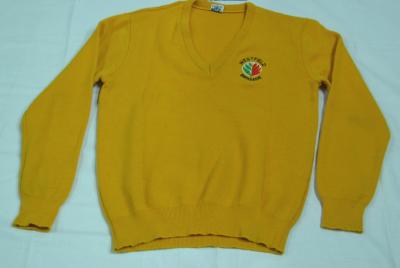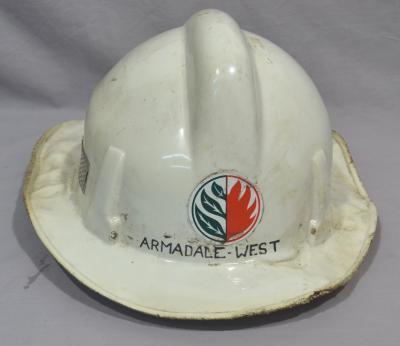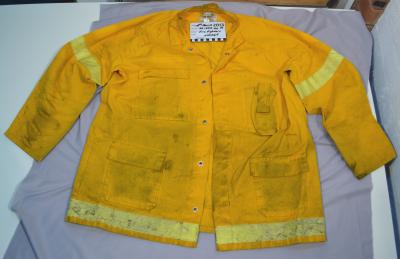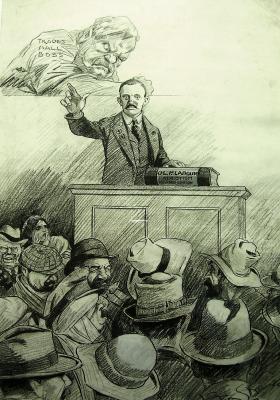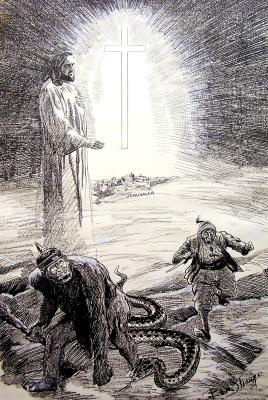CARTOON - UNDER WHICH SCALE
1923Paper & pencil cartoon. Depicts the image of a female in flowing robes with a blindfold and holding up a set of scales with [ARBITRATION] written on it. The figure is lifting her blindfold to look at the scales. Hands emerging from the clouds in the background are placing rolled up sheets of paper into the scales. The left hand has [FEDERAL AWARD] written on it and the right hand has [STATE AWARD] written on it. The female figure is standing in a pile of rolled up papers. Written across the pile of paper scrolls is [INDUSTRIAL / DISPUTES]. In front of her is a man in a suit and a bowler hat, with [EMPLOYER] written on a band, and another man in work clothes holding a shovel. Written on his shirt collar is [EMPLOYEE]
The cartoon was published in the Western Mail on 15 November 1923 and included the caption:
UNDER WHICH SCALE?
Mr. R.O. Law, president of the W.A. Employers’ Federation, in his annual address to members, dealt at great length with the question of arbitration. He said if arbitration is to be effective it must be applied expeditiously, and parties who are subject to the Act should be able to approach the Court without delay and have their troubles settled. The old difficulty which employers in this and other States have had to meet in endeavouring to work under dual authority, such as is created by the jurisdiction of Federal and State industrial tribunals in the same sphere, has become accentuated recently by the actions of the Federal Court, in one or two marked instances, of prescribing in awards rates of wages fixed on bases which relate to other parts of Australia, to the exclusion of bases which particularly concern Western Australia. - (News Item.)
Australia in the early1920s was facing falling commodity prices, inflation and a growing national deficit. At the same time workers also faced low wages thanks to post war inflation.
Wages were controlled by either a Federal or State industrial award arbitration system. Most wage disputes were heard by either the Federal or State industrial courts. In Western Australia employer groups were concerned that Federal wage rulings were based on cost of living and other issues facing the eastern states and did not reflect the economic situation in Western Australia and that there would be pressure to increase the State award to match the higher Federal award.
Details
Details
Artist's signature bottom right [Ben Strange]
HIGH
The Ben Strange cartoons are historically significant as they depict many key figures linked to the history and development of both Western Australia and Australia. Political figures who regularly appeared in his cartoon’s included John ‘Happy Jack’ Scaddan, the Premier of Western Australia from 1911 until 1916, and William ‘Billy’ Hughes, the Prime Minister of Australia from 1915 to 1923.
City of Armadale - History House
City of Armadale - History House
Other items by Ben Strange
- CARTOON - TRANSFUSION OF BLOOD
- CARTOON - CROWD AROUND CAR
- CARTOON - KING COAL'S GROWL
- CARTOON - THREE GOLFERS ON A GOLF COURSE
- CARTOON - YOUR EYES HAVE TOLD ME SO
- CARTOON - SHE'S COMING! - THE NEW TERROR
- CARTOON - THE ROAD TO ARMADALE
- CARTOON - STARVATION IN EUROPE
- CARTOON - INDUSTRIAL WRECKERS
- CARTOON - WHEN CONSTABULARY DUTYS TO BE DONE - A POLICEMANS LOT IS NOT A HAPPY ONE
- CARTOON - SANTA CLAUSE AND THE SILVER LINK
- CARTOON - THE WAITS CHRISTMAS 1916
Other items from City of Armadale - History House
- JUMPER, UNIFORM - FIREFIGHTER'S
- HELMET, FIREFIGHTER'S
- JACKET, UNIFORM - FIREFIGHTER'S
- PENCIL - AT FERGUSON ADVERT
- CARTOON - IN TROUBLED WATERS
- CARTOON - LABOUR PARTY I MUST DISOWN ALL KNOWLEDGE OF THE OBSTRUCTIVE ASS
- CARTOON - THE CRUCIFICTION OF REASON
- CARTOON - THE LAW OF THE SUSPECT CALUMNY
- CARTOON - THE SAME OLD COW ON THE LINE
- CARTOON - LABOUR REFORM
- CARTOON - THE TRIUMPH OF THE CROSS
- CARTOON - TWO OF A KIND
